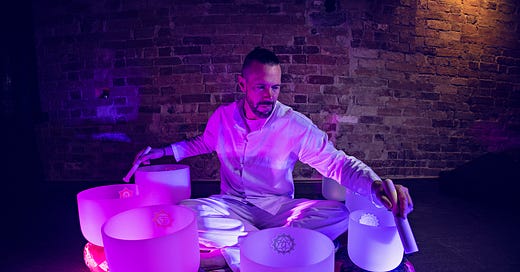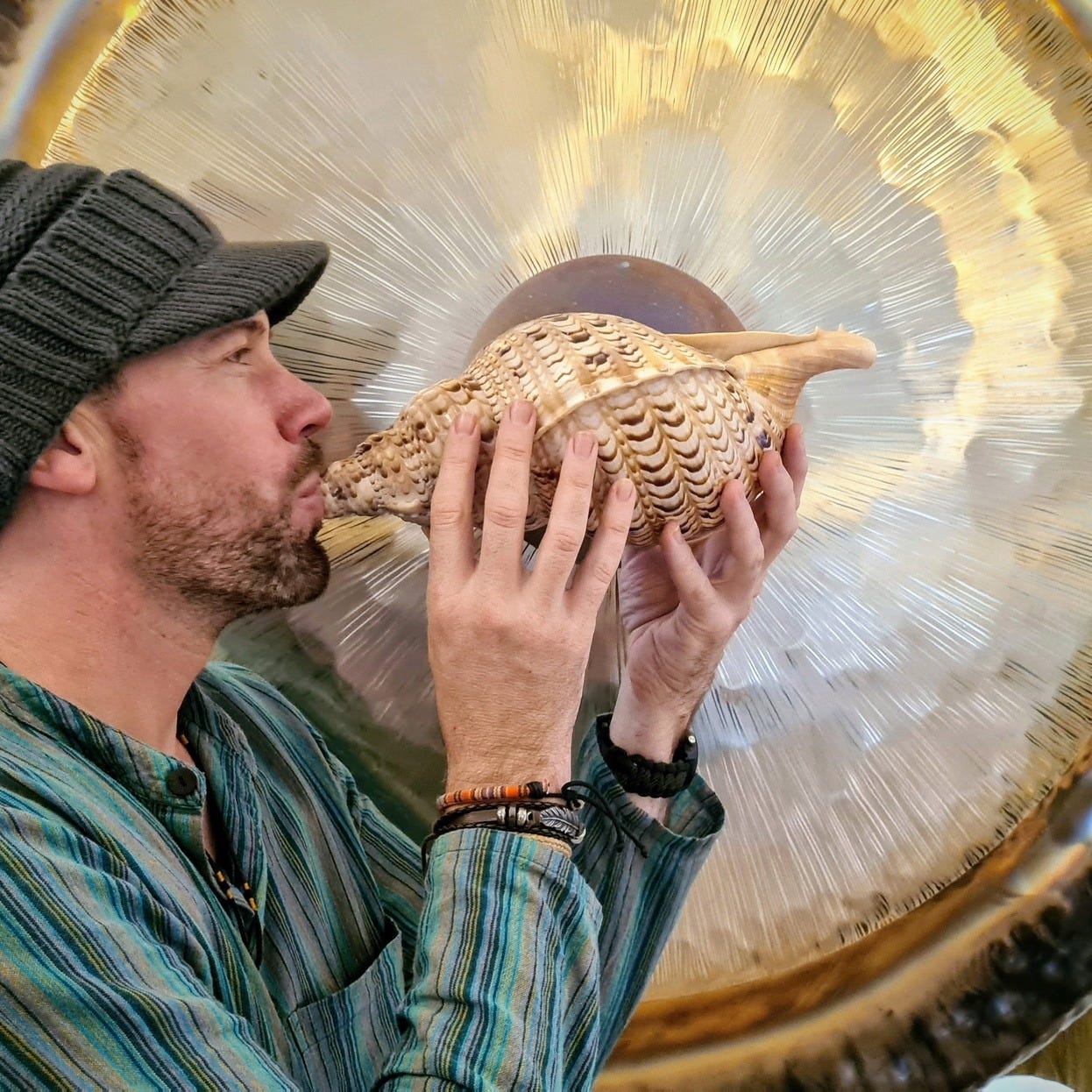Once a touring DJ, Robin Freeman is now a local sound healing practitioner who helps people sink into deep meditative states and become better able to face the challenges of modern life.
How did you become a sound healing practitioner?
I used to work in the music industry and I was on tour in Los Angeles and, unfortunately, I was under a lot of pressure. It was a really heavy schedule. I hadn’t seen my friends and family in the UK for quite a while. My record label was pushing me in a direction I didn't really want to go in. I was really stressed. I didn't realise just how stressed I was, and then I went through a bereavement. That was the catalyst and I just had some form of breakdown, basically.
So I got taken to this guy in California, a kind of holistic healer, and ended up staying with him for two weeks. He did all sorts of kind of holistic practices with me, including reiki and a gong bath.
I didn't know anything about [gong baths] and it blew me away. Coming from a musical background, music, sound, frequency, and the power that sound can have over us all fascinate me. Long story short, he became my first teacher. I didn't realise it at the time, but this guy was – and still is – pretty much the most respected gong master alive today.
Later, I stayed with an amazing couple in Wales and learned a completely different way of using gong and sound in a sound bath. They believe that silence is actually the most important part of the session. Everything was done subtly and gradually, building up the sound. It was more feminine, gentle, subtle. Whereas what I learned before was straight in and loud, forceful and masculine.
…what I do is facilitate the space for people to come and heal themselves
That was a fantastic insight into how I could use gong and sound in completely different ways to affect people completely differently, depending upon what we want to focus on.
After that, I travelled around the world for about four years, and immersed myself in lots of different tribes, civilizations and communities in different countries. I spent time with some incredible healers, and shamans.
How do you choose which instruments you're going to use?
In a sound journey or a sound bath, you could incorporate any instrument you like. You could have flute, guitar, a human voice. You could incorporate anything as long as it flows. For me, there are certain instruments I would predominantly use towards the beginning. Some instruments are quite kind of cleansing. So you could use ocean drums, shells, rattles, those kinds of things near the beginning. Then you could flow into something a bit more meditative and subliminal.
The centre point of the journey would be something like your gong, which – as long as the person playing it has been trained in the right way, which unfortunately a lot of people haven't – it will be very meditative. It is designed to just get you to let go and find a bit of clarity in your mind.
If someone's directing the gong bath or sound journey in the right way, it should have a bit of meditation guidance here. People would be encouraged to just let any thoughts and emotions come up without trying to block them or judge them. A lot of people find that at that point they're able to really deeply relax and find a bit of headspace.
Then towards the end you would gradually filter off the gong section, and you might come in with something quite airy, so things like chimes or a hand pan. They are quite angelic in their sound and leave you feeling happy and lifted.
How does sound heal?
I don't call myself sound healer. I call myself sound healing practitioner, because what I do is facilitate the space for people to come and heal themselves. And I think that's a really, very important point, that we all have the ability to heal ourselves. But a lot of us don't know how to tap into that or don't make the time for ourselves to be able to do that. I think anyone that would claim that sound healing could heal cancer or something is very deluded. It's not like that.
100% what it can help with is any of those lower vibrational states, which are fear, depression, anxiety, stress. And obviously those states do eventually, if not addressed, adversely affect our health.
It's about preventing any of those terrible things that can come up in your future by addressing them before they get to that stage. Addressing your stress, your burnout, your depression, prioritising yourself, making time for yourself.
What do you do in a session?
Firstly, I welcome everyone in and then we sit down and do a little bit of breathwork. We're breathing all the time, but most of the time we're shallow breathing which is when we just breathe into the chest. Whereas, if we draw the breath down deeper into our stomach area then it's a really great way to get the nervous system to start relaxing. That's not something many of us do in our busy day-to-day lives. We're waking up, rushing around, getting out the house, driving to work, working. The only time that we actually rest is during sleep. But when we're sleeping our brain is really active – we're dreaming, we’re in REM. So meditation is really, really important and if a gong bath or a sound bath is directed in the right way, it should be like the state of meditation.
Can you share something interesting you discovered on your travels?
I spent some time in a Buddhist temple in Sri Lanka. It was six weeks in there, no eye contact, no speaking for six weeks, and it was just focused entirely on meditation. There was one really short guy there, a monk from Tibet. The first time I saw him I actually thought he was statue – he was wearing this grey cloak with a grey hood over his face, sat cross legged in typical yoga pose on a grey brick wall. I saw him one morning and we did all of our meditation throughout the day. We went for our meal and he was there, hadn't moved. In the evening, about 9pm, we were all getting ready to go to sleep and he just suddenly got up.
When it was allowed, I spoke to him and said, “I thought you were a statue. How did you sit there for that amount of time?” And he said after that amount of time meditating he probably wouldn’t need to sleep for around three days. “When you're sleeping, your brain is constantly going and you don't realise but it's repairing your body, you're dreaming, you're in a dream state, you're in REM. But when you meditate – once you've learned to meditate properly – the way that it relaxes your physical, mental and emotional state is equivalent to about three or four nights of good sleep,” he said.
He described giving his mind the very best kind of rest that it could have. The power of meditation and the way that it can really create headspace for us and give our mind, our emotional state, our body, a real, deep rest – that's so powerful but a lot of us just don't do it in the Western world.
Should people try healing themselves with tracks available online?
Yeah, on YouTube for example, you’ll find thousands of sound bath or musical meditation videos, frequency meditation guides. There are so many on there.
Obviously, the best bet is usually just to look for one that's had several million views. You can be fairly confident that's usually a sign it's quite a good one.
But quite a few of these will be tuned to specific frequencies. You can find something that's going to work for whatever it is you're hoping to get help with. For example, if you're suffering with insomnia or sleep issues, there will be certain frequencies that will help calm the nervous system and the mind down and get you into a really lovely, relaxed state.
On the flip side, if you're struggling to concentrate and are easily distracted – perhaps you're suffering with ADHD – there will be some sound journeys or frequency videos on there to help tune you in and make you a bit more focused.
What advice would you give to your teenage self?
Pay more attention to people that are older than you because with age comes wisdom. When you're young, it's easy to disregard older people and their words of wisdom. “Oh, I'm being lectured and it’s boring,” and you switch off. But you can learn so much from people that have already walked the path. You can prevent yourself from having to learn a lot of things the hard way if you just listen to some of those people with more knowledge than yourself.
What's your favourite food or place to get food?
In Bournemouth, there's a fantastic, plant-based restaurant called 12 Eatery. The lovely guy that runs it is called Dalton. Whenever me and my friends want to have a little treat and eat in a restaurant in the Dorset area, 12 Eatery is where we go.
Do you have any wellness goals for yourself?
Just like everyone, I can be guilty of working all week and then getting towards the end of the week and thinking, “Hang on, when was the last time I took some time out? When was the last time I stopped?” So I think just making sure I spend as much time out in nature as possible – in woods, on beaches, out in the countryside. Whenever we're surrounded by nature, that's when we tend to be at our happiest, even if we don't realise it. Subliminally, there's just something inside us that craves and needs exposure to nature. I like to do weekly checks to make sure that I've had my nature fix.
Find out more here about joining a sound journey and gong bath led by Robin. They run on Friday and Sunday evenings in the Bournemouth area.







